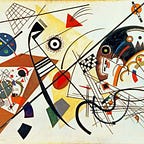Agent of Control
Why the obsession with control? Why must we grasp so hard to everything in our lives? In order to tackle this problem, it may be beneficial for us to start with where control originates in the first place. Let us start from the most tangible, the most acceptable, of thinking: that we are agents in the world. We naturally feel that we can sense, feel, and control our actions. Each of us has in our heads a voice all on its own. This voice, the little man, experiences the world; feels emotions; senses colors, tastes, sounds; and gives commands to the fleshy outer body. Moreover, this homunculus can ponder, wonder, rationalize, and learn, so that the corpse can continue to live. It would be fair, then, to ask whether this consciousness exists outside of ourselves, floating in the ether, or if it is integrated into the physical, a monism.
Start with the former — if there is an existence outside of the body, then we can go turtles all the way down: where does that exist? Why is there an “other” in the first place? And why not shave away the excess reasoning? Propping up an argument by using a similar argument is circuitous. We are then left with the latter: a unitary whole of mind and body. Next, then, we must ask about the relationship between the two. One could argue that they are codependent or that we cannot talk about the mind outside of the body as an appeal to Russell’s Paradox, but second hand empirical evidence shows there is physical existence outside of our own experience. I will not entertain an argument that suggests that our existence begins instantaneously at this very moment. It is impossible to have an discussion if we are to admit this line of reasoning because it can always be invoked and never leads to meaningful discussion.
Returning to our proper discussion, we are left with a few questions. Who between the mind and body commands whom, and how does one arise in the other? I cannot imagine one arguing that the mind precedes the body, else one would be able to point to an existence outside of our physical world, and it falls apart ut ante. So, the body comes first, or one can argue that they arise simultaneously. The lack of a consciousness at all, or at least lack of consciousness as the mature adult understands it, in an infant is clearly shown by the lack of clear memories from infancy. How can consciousness exist if we have no memory of it? Who gave the orders to the body if there were no mind? More on this below. Thus, we see that the body exists separately from the mind, that the mind develops from the body, and that the mind needs the body. If this precious mind and consciousness is truly powerless in its body, then we are not agents! We control nothing. Psychological experimentation shows that we react, learn, and sense without the need for consciousness (see “The Happiness Hypothesis”). Again, if the rider on the elephant is not necessary for the basic tasks we associate with the conscious mind, then where does it come from?
Fine, you might say, at least the mind is a passenger! Well, without skipping too far ahead, I agree. This consciousness that senses and feels empowered has much less power than we imagine, almost none in fact. So, our thoughts race and ride in our brains; they have no effect on our lives; then why exist at all? And this is precisely my point. The passenger does not exist! The echo in the machine arises from nothing more than raging stimulus gone haywire. How exasperating, how depressing, how VILE it must seem to hear someone denounce that which is most precious to us — the mind! But it is not real! The echoes batter around in our heads, the leftovers of experience, qualia unchained. It is all too easy to ignore me and live on in our world full of control and conviction in the reality we so desperately experience, and even if you accept what I tell you, it is more likely that you fall into depression filled with existential dread. There is no meaning to create here like the existentialists tell us comes after the climax and catharsis for if there is no person to experience that created meaning, why entertain the thought (excuse the pun). No, without a consciousness there is no experience, and without experience there is no meaning to create. But what do we do with this absurd reasoning? Again, some may waste away, some more quickly than others. Some may intentionally put on the spectacles and continue to live en bleu.
To me, however, this happy revelation leads to freedom. Pure and simple, without meaning, without real experience, and without the weight of the crown of control, I am left to follow the feelings that drive mechanical existence. Pleasure, in the philosophical sense, and pain, in the very real sense, are free to drive or curtail action for no purpose than fulfilling our biological dharma. Live for the day, says Horace. Some take this at face value, they see it as license to act rashly, but this is too simplistic. There are orders of pleasure, and there is advantage to living in a way that produces long term and sustainable pleasure. Live for today! Live in the moment, and let action, feedback, and reaction lead your body, and the mind, that passenger, will enjoy the trip.
